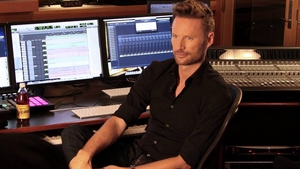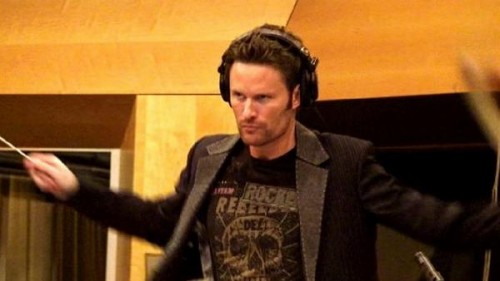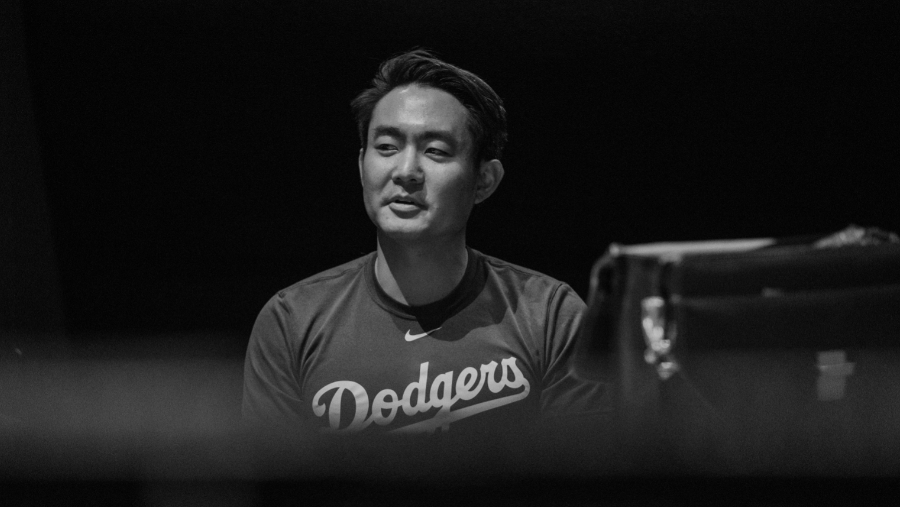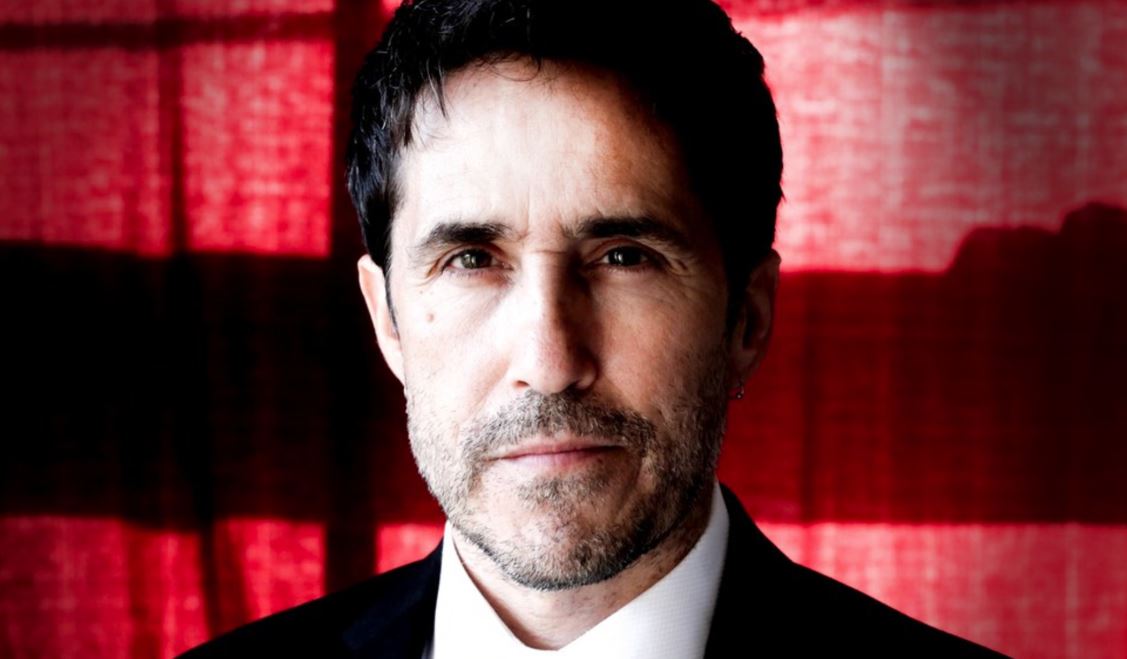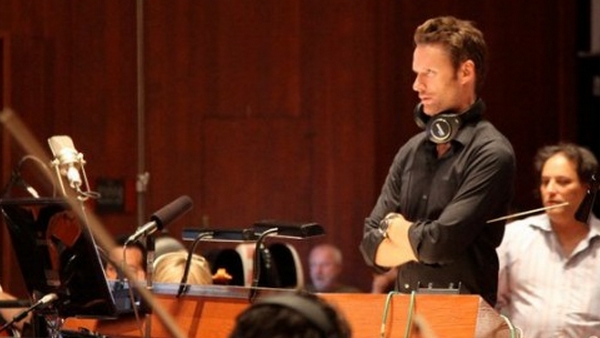 Welcome back for Part II of our exclusive interview with film composer Brian Tyler. Yesterday we posted the first half of our session with him and touched on his sensational scores to Iron Man 3 and Now You See Me (which opens nation-wide) today. So sit back and enjoy some more insights into the world of scoring film music (and video game music) courtesy of this uberly talented musician.
Welcome back for Part II of our exclusive interview with film composer Brian Tyler. Yesterday we posted the first half of our session with him and touched on his sensational scores to Iron Man 3 and Now You See Me (which opens nation-wide) today. So sit back and enjoy some more insights into the world of scoring film music (and video game music) courtesy of this uberly talented musician.
——————————————————————————————————————————-
– Brian, you’re multi-talented as far as playing so many instruments but you also orchestrate and conduct, so you really do it all. Is it necessary to be so versatile in order to get a job these days or do you do so much in order to have ownership of your music?
No I never did it by design to get gigs but I think it’s probably helped. I can also
understand the instruments I’m writing for because I probably played most of them at some level, or I have varying levels of skill depending on what it is. I don’t think it’s necessary to play a million instruments but it definitely helps to be able to write for them and especially mix your music with a variety of instruments. I’m very much involved with the mixes and everything that’s non-orchestral so on my scores if you hear drums, guitars, piano and all the different world instruments in the programming, that’s me, I’m mixing them as I’m too particular and it may be hard for me to let it go. I’ve found when I have other people do it, it’s not the sound I’m looking for and I think that should be the case if you’re a composer. It’s great to be able to have the ability to do that so when you don’t like something you can change it to be how you envisioned it in the first place and get it to sound like it does in your head because no one knows your music like you. For me, just learning all these things is almost like an extension of wanting it to sound like what it sounds like in my head.
– Well sure, you’re an artist and the more things you can paint with the closer your vision will come to being realized.
Yeah totally, you can imagine that’s why I like conducting. It’s like a sculptor who wants to sculpt something but are trying to describe to another sculptor what they’re envisioning. But to have that other person actually carve it would be very difficult to actually get the artistry across when it’s someone else doing it.
– That’s a very good analogy. You’re an artist who doesn’t have one signature sound. More to that point there aren’t a lot of films of your resume that aren’t high octane so tell me, do you seek them out or do they find you?
Ha, ha, I think they probably find me *laughs*. The octane level is something funny. There’s been lots of music and films I’ve done otherwise but it’s just the ones that people have watched are the ones that are high-octane *laughs*. So it tends to be more of what I’m known for and I kind of love writing in all kinds of genres including action, I love it, as well as science fiction. So something like Now You See Me is kind of different which is fun for me. It has one car chase, so there’s your action bit and some running around here and there but it’s part of a caper, a battle of wits, and I loved doing that and so it’s great when people get to see that side, movies like The Greatest Game Ever Played or Partition or Annapolis, something that is a complete and straight up drama, those are a blast for me as well because it’s something different but still a challenge. Any of these things seem to fit my personality and I just kind of go with the flow and whatever the story is, I just adapt to it. In order to be a composer you really have to be a chameleon and that’s what I always loved about John Williams. You could watch so many of his movies and hear so many different scores, they’re just so varied. Just look at any of the great ones, Hans Zimmer, Danny Elfman, Jerry Goldsmith, they all can maneuver around different genres fairly easily and it’s something I feel comfortable maneuvering around.
– Speaking about different genres and different types of storytelling, video games also make up a large portion of your resume. How does scoring for films help you score games and vice versa?
Video games have a different feel sometimes and the thing that they represent for me is that you can do things that are really outside the box. Games give you a lot of room to maneuver and allow for experimental music and I just love that, it’s like an outlet and allows you to push the envelope even harder and further. Not only that but I grew up playing video games so to me entertainment was a combination of movies, going to concerts and seeing live stage shows and then video games. But the games were my interactive movie growing up and I think it’s a really important part of entertainment culture now. There’s a lot of great work being done there.
– When I spoke to Michael Giacchino he told me about getting his big break scoring video game music, and just recently I interviewed Harry Gregson-Williams and we talked about his work, even Hans Zimmer scores games. Is that the next logical step for some composers?
Yeah sure. I grew up playing their games and I actually have Lost World the game which Giacchino scored, I think it was the first thing that he scored, and I was a definite composer nobody at the time probably in my last year of college, and I remember thinking, “wow, this is awesome. Someone put orchestral music in a game!”. Then a couple years later I got Metal Gear Solid, which I love that game, and I thought this sounds cool and then I saw the credits come up and it was Harry Gregson-Williams. I was a fan of his too and still of both of them. I know them both and they’re sweet guys, I love them. But for me I remember the scores to a lot of these games even more than movies and I hear that all the time from score fans or people who are fans of these games.
I mean, these people don’t just watch a 2 hour movie and go home. They’re playing these things sometimes for years. It takes a lot of time on a game just trying to complete sometimes 20, 30, 60 hours of game play, sometimes more then when they play three or four times you’re talking hundreds of hours listening to your score versus two and when they hear that score it has an emotional connection that you don’t necessarily get otherwise. It becomes so ingrained in the experience. When they hear that music outside of the game it instantaneously takes you back because “you were there”. It’s not like you were watching it in a theater, you were walking through it, literally moving around in this story, this world doing something. So it can be weirdly emotion to hear a score from some game you played 10 years before and it’s always so cool to hear that from the fans and people who have bought my stuff because for a lot of people it means so much to them. They’ve experienced this game and they’ve gotten through it and it’s a part of their lives you know as opposed to just watching something passively. I think it’s a very interesting medium to be involved with.
– Aside from the obvious ones, what are the differences between scoring game and a film? Is it easier in any way and do you prefer it at all?
No, no it’s definitely not easier. You do have some technical hurdles that you have in a game that you don’t have in a movie. For
instance you can’t just have music that scores a theme as if it were static. It changes every time the player plays it depending on how good they are and how fast they go through the level or maybe how they do something wrong, and whether they’re losing or winning.
All that gets built into the actual score and that’s difficult because you have to have things that go in a million different directions and then be connected so you can anticipate every different scenario that the gamer might do. So on a technical level it’s actually much more difficult.
– One thing I’ve been dying to talk to you about is your work on composing the new/updated Universal logo theme music. That must have been an enormous honor and undertaking. So what was that like? What kind of difficulties and responsibilities did you face?
Well for one it was a huge task because you’re talking about such a classic theme. You don’t want to go in the wrong direction but you want to take the spirit of it and your own take on it and make something new but at the same time you’re preserving the integrity of what Jerry Goldsmith originally wrote. So I thought the best way to do that was to trying to fit something into the logo music itself, you know just the logo of the globe spinning and the Universal Pictures text coming around it. But then I thought, “you know I’m concentrating on this small thing too much, I’m going to write a full suite, a theme for the 100 year anniversary of Universal Pictures” and so that’s what I did. I wrote a long form piece that is a full length suite that would have these themes that would go in different directions and then I’d be able to go back and find my way and do the version that’s in front of every Universal movie that’s released these days. So I had to step away from it before I came around to it in a way and I’m really proud of it but it’s certainly a tribute to Jerry Goldsmith.
———————————————————————————————————————-
See Brian at work on the theme to Universal’s centennial celebration and the music he composed for the company’s brand new logo below…
———————————————————————————————————————-
– How long did that process take? There is existing material but even with your suite you still you only have 20 odd seconds to really sell it and make a reverent and impacting statement. So how long did it take to come up with that?
Well it’s hard to say because I have to count the time it took to do the suite which took some time in order to get there and to find a way to preserve that 25 second piece. But to get the small part to be awesome meant doing the big part just right. So I’m not sure how long it took, I don’t remember, but I know I sat down with it for a while and in fact it was kind of fun because there was no picture to have to follow off of or a long form suite so I just wrote it by hand. It was never locked down and the first time it ever really existed was the first time the orchestra played it.
– Going back to the start just a bit, your Iron Man 3 score was big and substantive but also just a whole lot of fun. Again I think it’s what a superhero sound needs to be so you kind of set the bar for what’s to come in the future. But Now You See Me has this really cool ethereal, electronic rockabilly sound and, as you say, a real hybrid. So how do those different sounds relate to your personal taste? Or better how do you adapt your personal styles to the style of the story?
Hmm, you know I haven’t run into that. I mean there are times when movies don’t turn out as well as you hope they would have but pretty much in terms of what I like in film there’s no type of music or type of film I don’t like, so I always feel pretty at home working. In other words I don’t have to hold my nose, I can really just jump into it like “ok, cool. I’d watch this movie”. If it at least meets that standard then the rest of it is Ok with me. Regardless of the quality of the film as it turns out, as it’s being edited, films can go in a variety of directions as it’s being made you always want to do your job well and take it very seriously. Treat it like it’s Citizen Kane and give it your all. But it’s always a pleasure and a new experience because I have this canvas that I can write anything on and really work with the music and do lots of different kinds of things as opposed to being in a situation where you’re kind of recording music where you’re in a band or an artist and you only do something once every couple of years and have maybe 10 tracks to work with but on a movie you can go in so many different directions and you can do it often. But it’s definitely a great outlet for someone who has a hard time staying idle.
– I think I’ve taken up enough of your time so I have just one more question for you Brian. Let’s talk about what’s on the horizon for you. Can you tell us about your next project, things on your wish list, or about a series you want to revisit?
Yeah I always have wish lists because I’m a big movie fan. Certainly I’d love to return to comic films because I got a thing for working in the superhero genre. I had such a great time and loved
working on Iron Man 3 so I would always love to work on a Marvel film or a superhero movie or anything comic related, it’s just part of my blood. I love that, I love science fiction and am a big fan of a lot of different series and of course I have a thing for historical dramas too. I just love watching them. In fact I was a history major and being able to delve into that more would be fantastic, working on a project about a historical event or a historical figure or war time kind of thing. All these kinds of things run around my mind. I like looking for new challenges and new horizons but I’m really lucky to be able to be doing what I’m doing as a career. It’s really that my hobby has become my career and my passion is what I do as my job, so it’s kind of hard to call it a job because I just love it.
– Well that’s a good place to be Brian, I think everybody strives for that so it’s really cool that you’re there. I don’t know how much water my opinion holds but I’m pretty sure you’re a lock for the next superhero movie, whether it is another Iron Man or something else. I think it’d be a crime if the didn’t ask you and Shane Black to keep doing what you’re doing.
Oh gosh, that would be great you know. Shane’s awesome and he and Marvel make really great movies so it’d be interesting to see what’s on the horizon and to see what’s next. I do have some things down the pike that will come out in 2014 that should be interesting. I’m re-teaming with Jonathan Liebesman, who is a good friend of mine, we’ve been doing films together for the last 10 years, so we’re doing the Ninja Turtles movie which should be really fun. That’s another thing that I grew up with so I’m excited about that, it’s gonna be a blast. I also did a movie called Standing Up that D.J. Caruso directed, he was the director of Eagle Eye, we started doing films back then together. It’s kind of a Stand By Me, coming-of-age film and I don’t think people will expect it because it’s kind of a throwback, Americana type story about two 12 year-olds who get lost in the wilderness and it’s a great, sweet, really heart-felt movie so look out for those as well.
– Sure, I’ll be eagerly anticipating those as well. I too grew up with Ninja Turtles so I’m excited for that. Brian I really appreciate your time and look forward to everything you come up with and hope to talk to you again real soon.
Great. Sounds good. Thanks a lot and talk soon.
——————————————————————————————————————————-
Both Iron Man 3 and Now You See Me are in theaters now and the film scores, which we HIGHLY recommend, are also available. Pick either of them up and we promise you won’t be disappointed. Thanks very, very much to Brian Tyler for his time.
